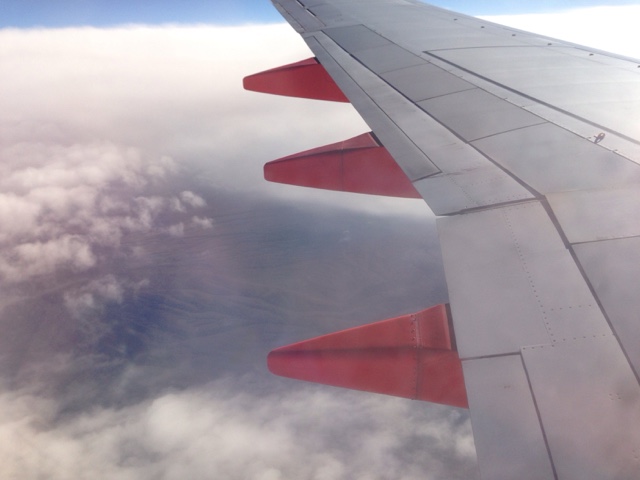outside the window (I always like to sit by a window on the airplane—always) the clouds looked like ice. tundra and snow crags. so solid. I know in my head that clouds are the furthest thing from solid, but it still looked like if the plane wanted to stop for a minute, we could have all gone out and danced on top of the sky.
of course we didn't. we couldn't have.
instead we flew, we landed, we waited around in a Dallas airport for a while. we eventually got on another plane and we continued on our way to Phoenix.
during the flight I alternately...
1. read from Tim Ingold's Being Alive,
2. worked on winding a few loopy hanks of handspun yarn into significantly-less-likely-to-tangle balls,
3. read from Felicia Day's memoir You're Never Weird on the Internet (Almost),
and 4. looked out the window.

the southwest looks very brown and dry, and veined with dusty little crevices, most of it.
but there are pretty blue ridges off in the distance, casting shadows and halos.finally the cracked, weathered wilderness gives way to artificial green bits. propped up human civilizations in the middle of a desert expanse. as we approached our landing, I noticed all the bright blue orbs of back-yard swimming pools and thought about all the infrastructure that makes so many separate household oases possible.
Ingold's book = everyday everything dipped in anthropology, and one of his observances involves the difference between transport and wayfinding. technologies like cars and trains and flying machines allow us to skip the patient, careful wayfinding part of travel and be transported from there to here, no fuss, no footprints, no in-between. I thought about this a lot on my flight to Phoenix and my flight home again. does calling the plane where I'm sitting an in-between of its own change the equation at all? does it put kinks in Ingold's dichotomy?
I don't know. probably not. I don't have to think about where the plane is going. I don't decide much about its journey. my decisions only concern what beverage the stewardess brings me and which ebook to let my eyes wander over. the school stuff I should be focused on? or the funny memoir of an actress geek?
reading used to be such a brilliant escape for me. writing, too. those worlds out there where things can be different and stories have shapes... pages where plot lines coalesce into solid art...
all my academic reading is not like that. academic writing is not like that either. what threads of escape there are in it—into new ideascapes or grand what-ifs or theoretical castles in the distance—come second to the confrontation of the scholarship. it's asking you to evaluate it, to take notes on it, to judge and weigh and respond to it. academic stuff wants to be used for something. it wants to work. it wants to accumulate citations.
I liked Ingold's book. his other book, Lines, was great too. unlike Lines, this one seemed long. but it has a whole chapter (chapter 3) about the uniqueness and value of being barefoot, and again, how technologies (shoes, in this case) have interrupted our connection to the earth in an unignorable way.
being in an airplane is perhaps the most spatially disconnected I have ever been from the planet. thinking about that may or may not get me anywhere.
the clouds melted, eventually, into cornsilk and cotton, less solid-seeming, more easily dissipated. not for dancing on. my yarn, eventually, ended up in neat spheroids, and my books, eventually, brought me to their closing pages.

I, eventually, hope to walk around barefoot more often. but spring time is still far, far away from here.




No comments:
Post a Comment